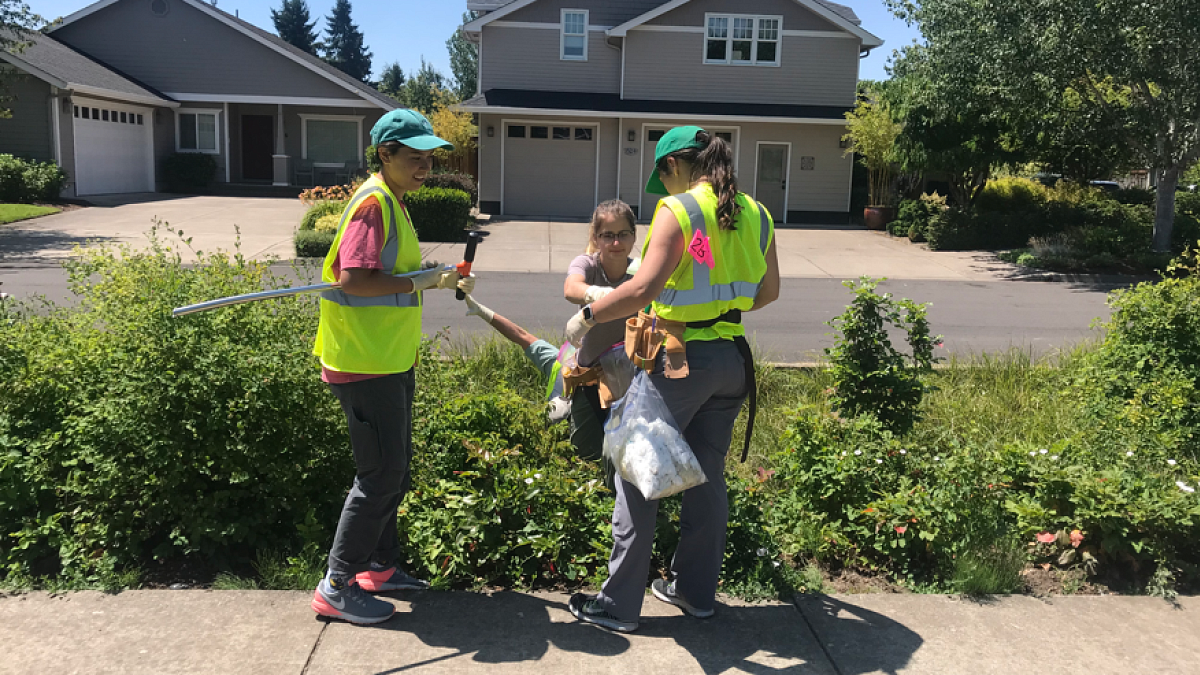A University of Oregon scholarship program designed to recruit, prepare and support qualified science majors is helping pave the way for students like Evi Hernandez Hill to pursue teaching careers in high-need districts.
Hernandez Hill is one of four UO undergraduate science majors to receive an Experiencing Science Practices through Research to Inspire Teaching Scholarship, known as an ESPRIT award. She and fellow recipients Emma Mullen, Justin Day and Nathan Ahn were honored at a signing ceremony on Nov. 21 in the HEDCO Building atrium.
As recipients of the scholarship, the four students each will receive $35,000 in support for a two-year program. That includes their senior year of training and a year in the UOTeach Program, a highly focused one-year master’s level teacher licensure program designed to produce highly qualified teachers with advanced instructional and classroom expertise.
The program is funded by the National Science Foundation with a $1.2 million award over five years.
As a prerequisite to the scholarship, students spend a summer as interns working with a mentor on a research project. Hernandez Hill worked in the microbial ecology lab of Krista McGuire, an associate professor in the Department of Biology. She said the experience prepared her to be independent in leading lessons and explaining information.
“I hope to bring understanding, experience and patience to the classroom,” said Hernandez Hill, a senior biology major. “I am so excited to be able to continue this journey towards teaching.”
The program helps make science education more engaging, said Lauren Hallett, an assistant professor in the Department of Biology and the Environmental Studies Program and an ESPRIT mentor to scholarship recipient Justin Day.
“Science education often focuses on teaching students about what is already known,” Hallet said. “That moment when you see someone learn to ask a question about what is unknown is really exciting, and I think it draws people into science. Creating those moments is what the ESPIRIT program trains our future science educators to do.”
Bryan Rebar, associate director of UO STEM Core, a consortium of UO science, math and education faculty members who support the center, said the aim is to make the path to science teaching more visible and appealing to science students.
Rebar wants to encourage students studying the sciences to consider a career in the classroom, particularly in disciplines in which teachers are badly needed. Those include subjects like chemistry and physics, which are consistently ranked as the highest-need areas among all academic disciplines.
The ESPRIT program also addresses the issue of K-12 science educators teaching subjects without being fully qualified. Only 47 percent of physics classes are taught by a teacher with a degree in the subject, compared with 73 percent of biology classes and about 80 percent of humanities classes, according to the Physics Teacher Education Coalition.
“We want teachers who understand what it takes to do science and can engage their students in authentic science experiences,” Rebar said. “They can bring the excitement of scientific discovery to their students through authentic investigations that they help their students design.”
All told, 11 students have received the ESPRIT award since 2017. The first two award recipients, Erika Flockoi and Halli Roussell, graduated from the UOTeach program this year and are currently in their first years as science teachers in high-need Oregon schools.
Hernandez Hill said ESPRIT has provided the support she needs to navigate the process so she can focus on developing herself as a teacher. Thanks to the program, she said, she is looking forward to a career in education.
So too is fellow recipient Justin Day, a senior majoring in biology with a minor in environmental studies. Day plans to pursue a master’s in education next year through UO Teach with the goal of becoming a K-12 science teacher.
“I hope to be able to go into schools and take these students who might not necessarily believe in themselves or have the resources necessary,” Day said. “And to show them that they can do what they want to do and maybe get them excited about science.”


